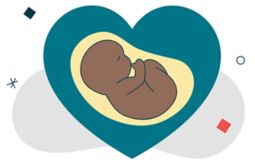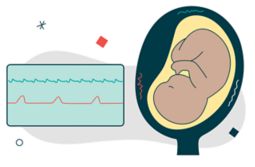You're starting your last trimester. You'll probably feel your baby moving around more. Your back may ache as your body gets used to your baby's size and length. Take care of yourself, and pay attention to what your body needs.

Talk to your doctor about getting the Tdap shot. It will help protect your newborn against whooping cough (pertussis). Also ask your doctor about flu and COVID-19 shots if you haven't had them yet. If your blood type is Rh negative, you may be given a shot of Rh immune globulin (such as RhoGAM). It can help prevent problems for your baby.

You may have Braxton-Hicks contractions. They are single or several strong contractions without a pattern. These are practice contractions but not the start of labor.
4 ways to take care of yourself during weeks 26 to 30 of pregnancy
Be kind to yourself.
- Take breaks when you're tired.
- Change positions often. Don't sit for too long or stand for too long.
- At work, rest during breaks if you can. If you don't get breaks, talk to your doctor about writing a letter to your employer to request them.
- Avoid fumes, chemicals, and tobacco smoke.
Be sexual if you want to.
- You may be interested in sex, or you may not. Everyone is different.
- Sex is okay unless your doctor tells you not to.
- Your belly can make it hard to find good positions for sex. Experiment and explore.
Watch for signs of preterm labor.
These signs include:
- Menstrual-like cramps. Or you may have pain or pressure in your pelvis that happens in a pattern.
- About 6 or more contractions in an hour (even after rest and a glass of water).
- A low, dull backache that doesn't go away when you change positions.
- An increase or change in vaginal discharge.
- Light vaginal bleeding or spotting.
- Your water breaking.
Know what to do if you think you are having contractions.
- Drink 1 or 2 glasses of water.
- Lie down on your left side for at least an hour.
- While on your side, feel the top of your belly to see if it's tight.
- Write down your contractions for an hour. Time how long it is from the start of one contraction to the start of the next.
- Call your doctor if you have regular contractions.
Follow-up care is a key part of your treatment and safety. Be sure to make and go to all appointments, and contact your doctor if you are having problems. It's also a good idea to know your test results and keep a list of the medicines you take.
When should you call for help?
Call 911 anytime you think you may need emergency care. For example, call if:
- You have severe vaginal bleeding. You have soaked through one or more pads in an hour, and the bleeding is not slowing down.
- You have sudden, severe pain in your belly that does not go away.
- You have chest pain, are short of breath, or cough up blood.
- You passed out (lost consciousness).
- You have a seizure.
- You see or feel the umbilical cord.
- You think you are about to deliver your baby and can't make it safely to the hospital or birthing center.
Call your doctor now or seek immediate medical care if:
- You have vaginal bleeding.
- You have belly pain.
- You have a fever.
- You are dizzy or lightheaded, or you feel like you may faint.
- You have signs of a blood clot in your leg (called a deep vein thrombosis), such as:
- Pain in the calf, back of the knee, thigh, or groin.
- Swelling in your leg or groin.
- A color change on the leg or groin. The skin may be reddish or purplish.
- You have symptoms of preeclampsia, such as:
- Sudden swelling of your face, hands, or feet.
- New vision problems (such as dimness, blurring, or seeing spots).
- A severe headache that will not go away.
- You have a sudden release or slow trickle of fluid from your vagina. This may mean your water has broken.
- You've been having regular contractions for an hour at less than 37 weeks. This means that you've had at least 6 contractions within 1 hour, even after you change your position and drink fluids.
- You notice that your baby has stopped moving or is moving less than normal.
- You have signs of heart failure, such as:
- New or increased shortness of breath.
- New or worse swelling in your legs, ankles, or feet.
- Sudden weight gain, such as more than 2 to 3 pounds in a day or 5 pounds in a week.
- Feeling so tired or weak that you cannot do your usual activities.
- You have symptoms of a urinary tract infection. These may include:
- Pain or burning when you urinate.
- A frequent need to urinate without being able to pass much urine.
- Pain in your low back (below the rib cage and above the waist).
- Blood in your urine.
Watch closely for changes in your health, and be sure to contact your doctor if:
- You have vaginal discharge that smells bad.
- You feel sad, anxious, or hopeless for more than a few days.
- You have skin changes, such as a rash, itching, or a yellow color to your skin.
- You have other concerns about your pregnancy.
If you have labor signs at 37 weeks or more
If you have signs of labor at 37 weeks or more, your doctor may tell you to call when your labor becomes more active. During active labor:
- Contractions happen more often and at regular intervals (about every 3 to 5 minutes).
- Contractions last longer (about 60 seconds or more).
- Contractions get stronger and are hard to talk through.
Call 911 anytime you think you may need emergency care. For example, call if:
- You have severe vaginal bleeding. You have soaked through one or more pads in an hour, and the bleeding is not slowing down.
- You have sudden, severe pain in your belly that does not go away.
- You have chest pain, are short of breath, or cough up blood.
- You passed out (lost consciousness).
- You have a seizure.
- You see or feel the umbilical cord.
- You think you are about to deliver your baby and can't make it safely to the hospital or birthing center.
Call your doctor now or seek immediate medical care if:
- You have vaginal bleeding.
- You have belly pain.
- You have a fever.
- You are dizzy or lightheaded, or you feel like you may faint.
- You have signs of a blood clot in your leg (called a deep vein thrombosis), such as:
- Pain in the calf, back of the knee, thigh, or groin.
- Swelling in your leg or groin.
- A color change on the leg or groin. The skin may be reddish or purplish.
- You have symptoms of preeclampsia, such as:
- Sudden swelling of your face, hands, or feet.
- New vision problems (such as dimness, blurring, or seeing spots).
- A severe headache that will not go away.
- You have a sudden release or slow trickle of fluid from your vagina. This may mean your water has broken.
- You've been having regular contractions for an hour. This means that you've had at least 6 contractions within 1 hour, even after you change your position and drink fluids.
- You notice that your baby has stopped moving or is moving less than normal.
- You have symptoms of a urinary tract infection. These may include:
- Pain or burning when you urinate.
- A frequent need to urinate without being able to pass much urine.
- Pain in your low back (below the rib cage and above the waist).
- Blood in your urine.
Watch closely for changes in your health, and be sure to contact your doctor if:
- You have vaginal discharge that smells bad.
- You feel sad, anxious, or hopeless for more than a few days.
- You have skin changes, such as a rash, itching, or a yellow color to your skin.
- You have other concerns about your pregnancy.
Where can you learn more?
Go to http://www.healthwise.net/patientEd
Enter S999 in the search box to learn more about "Weeks 26 to 30 of Your Pregnancy: Care Instructions".
Current as of: July 15, 2025
Author: Ignite Healthwise, LLC Staff
Clinical Review Board
All Ignite Healthwise, LLC education is reviewed by a team that includes physicians, nurses, advanced practitioners, registered dieticians, and other healthcare professionals.

